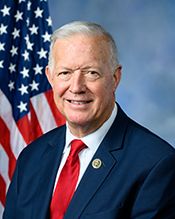0
Stop the Baseline Bloat Act of 2024
10/9/2024, 5:33 PM
Summary of Bill HR 8068
Congressional Summary of HR 8068
Stop the Baseline Bloat Act of 2024
This bill changes the assumptions that the Congressional Budget Office uses to calculate the baseline for discretionary spending. (A baseline is a projection of federal spending and receipts during a fiscal year under current law.) Specifically, the bill changes the assumptions used for the discretionary spending baseline to exclude (1) resources designated as an emergency requirement, and (2) resources provided in supplemental appropriations laws.
Read the Full Bill
Current Status of Bill HR 8068
Bipartisan Support of Bill HR 8068
Total Number of Sponsors
1Democrat Sponsors
0Republican Sponsors
1Unaffiliated Sponsors
0Total Number of Cosponsors
16Democrat Cosponsors
2Republican Cosponsors
14Unaffiliated Cosponsors
0Policy Area and Potential Impact of Bill HR 8068
Primary Policy Focus
Economics and Public FinancePotential Impact Areas
Alternate Title(s) of Bill HR 8068
Comments

Alaiya Cummings
1 year ago
This bill is just terrible, I can't believe they are trying to pass it. It's going to make everything worse for us hardworking Americans. I don't know how we're going to survive if this thing goes through. It's going to hurt all of us in the end.

Jaycee Evans
1 year ago
I'm not so sure about this new bill. It seems like it could have some negative consequences. #politics #HR8068

Lila Merritt
1 year ago
I think this bill is a step in the right direction. It aims to stop unnecessary spending and reduce government waste. By cutting down on baseline bloat, we can ensure that taxpayer dollars are being used efficiently and effectively. This bill will help save money and make sure that resources are being allocated where they are truly needed. I believe that this is a positive move for our country and I hope to see more legislation like this in the future.

Casen Collins
1 year ago
I support this bill, it could help with spending issues.

Travis Hood
1 year ago
This bill sounds good. Who wins from it?

Noa Hsu
1 year ago
This bill is great! It stops the government from wasting money on unnecessary programs. It's about time they start being responsible with our tax dollars. This bill will help save money and make sure it's being used for important things. I'm all for it! #StopTheBaselineBloatAct2024 #SavingMoney #ResponsibleSpending





